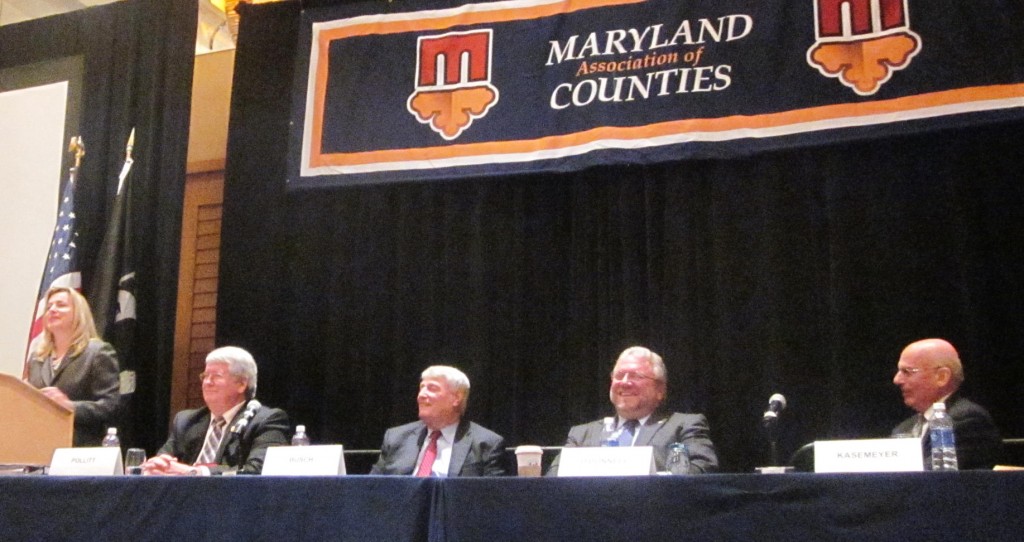Busch uses PowerPoint to make power points

Stacy Mayer, governor’s office; Wicomico County Executive Richard Pollitt; House Speaker Michael Busch; House Republican Leader Tony O’Donnell; Senate Budget & Taxation Committee Chair Ed Kasemeyer
By Len Lazarick
[email protected]
CAMBRIDGE, Md. — When Speaker Michael Busch stands in front of the House of Delegates Wednesday for his 10th routine re-election as its presiding officer, 70% of the elected officials will be Democrats.
When he faced county elected officials Friday morning in another annual routine at a Cambridge hotel, perhaps half of them were Republicans and even the Democrats from mostly larger, more urban counties were none too thrilled with how they’ve been hurt by actions in Annapolis.
Knowing his hostile audience, Busch came armed with an unusual weapon – unusual at least for a State House where the oldest parts date to the Revolutionary War. The speaker, a man not renowned for his tech savvy, used a PowerPoint presentation to refute a widely held belief among rural Republicans that the state was waging war on the more rural parts of the state.
“It doesn’t play out,” Busch said. While the method may have been new for the Democratic leader of the House, the points had been made before.
Redistributing from rich to poor
Both personal income and population growth were still centered in the urban areas of the Baltimore-Washington corridor, and the recipients of state aid were the poorer jurisdictions, which except for shrinking Baltimore City, were mostly more rural on the Eastern Shore and Western Maryland.
In particular, Montgomery County, with more people than the state of Delaware and higher tax rates, gets less back in state aid for schools and school construction than do counties with lower local taxes.
House Republican Leader Tony O’Donnell, Busch’s regular protagonist in these legislative previews sessions at the Maryland Association of Counties annual meeting, was surprised at the use of the PowerPoint, and said his side would have to “move up their game.” (“Buckle your helmet,” Busch responded in an aside.)
Based on a study of state and local fiscal relationships two years ago, O’Donnell said, ‘it’s a very complicated relationship” and “Maryland has a very, very progressive redistribution system,” in which wealthier subdivisions subsidize jurisdictions with less wealth.
Yet, Busch complained, as he has in the past, that none of the Republicans vote for tax increases that wind up benefiting their jurisdictions.
Transportation funding is still difficult issue
But that’s not what the county officials wanted to hear about. They wanted to know about the $700 million in highway user revenues that many counties used for a majority of their road projects, but that the state diverted to education.
“We know there are challenges in transportation revenues,” Busch said. But to get a gas tax increase, “that’s still a tough sell for legislators.”
“I think it’s going to be difficult,” said Sen. Ed Kasemeyer, chairman of the Budget and Tax Committee filling in for Senate President Mike Miller (but admitting he couldn’t speak for Miller). “We’ve waited too long,” with the last gas tax hike 20 years ago, and “now we’re stuck.”
Even a 10-cents per gallon increase “isn’t going to get what we need” and “the public would probably scream.”
Montgomery County Council member George Leventhal complained that he didn’t hear the governor advocating for more transportation funding. He’s heard a lot about transit oriented development (TOD), but “if we don’t invest in T, we’re not going to get D.”
Stacy Mayer, the governor’s legislative director, defended Gov. Martin O’Malley, saying “he did put in legislation to do that.”
“We have made a case for the need,” Mayer said.
O’Donnell, who ran for Congress last year against House Minority Whip Steny Hoyer, said he spent a lot of time at Metro stops, and complained “we’re subsidizing about 70% to 80% of our fares on our mass transit system.”
Busch emphasized, “we need to get to 71,” the bare constitutional majority needed to pass any bill. “I know what it means to get to 71 votes. … It’s stressful.”
“If you’re going to do something, it has to be comprehensive,” Kasemeyer said, otherwise it’s not worth the effort. “A regional approach, maybe that’s the way to pursue this thing.”
Other state policies costly
Some Republican county officials were concerned about other state policies that are costing them money.
“A lot of policies coming out of Annapolis are not based on scientific fact and economic numbers,” said Carroll County Commissioner Richard Rothschild. He has been a strong opponent of state growth controls imposed by Plan Maryland.
Frederick County Commissioner Paul Smith said the Maryland Department of the Environment has imposed “exorbitant costs to clean the bay,” including septic system controls and stormwater management fees.

MarylandReporter.com is a daily news website produced by journalists committed to making state government as open, transparent, accountable and responsive as possible – in deed, not just in promise. We believe the people who pay for this government are entitled to have their money spent in an efficient and effective way, and that they are entitled to keep as much of their hard-earned dollars as they possibly can.
